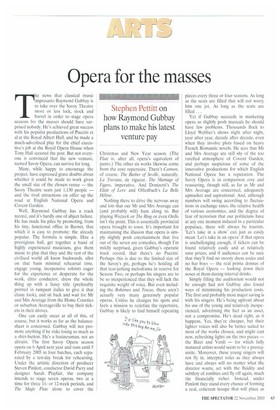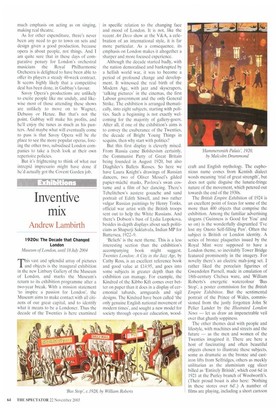Opera for the masses
Stephen Pettitt on how Raymond Gubbay plans to make his latest venture pay
The news that classical music impresario Raymond Gubbay is to take over the Savoy Theatre more or less lock, stock and barrel in order to stage opera seasons for the masses should have surprised nobody. He's achieved great success with his populist productions of Puccini et al at the Royal Albert Hall, and he made a much-advertised play for the chief executive's job at the Royal Opera House when Tony Hall secured the post. But not everyone is convinced that the new venture, named Savoy Opera, can survive for long.
Many, while happy to encourage the project, have expressed grave doubts about whether it could be made to work given the small size of the chosen venue — the Savoy Theatre seats just 1,130 people — and the rival attractions on offer up the road at English National Opera and Covent Garden.
Well, Raymond Gubbay has a track record, and it's hardly one of abject failure. He has made his piles by promoting, from his tiny, functional office in Barnet, that which it is easy to promote: the already popular. The formula is simple. Hire a prestigious hall, get together a band of highly experienced musicians, give them music to play that they and the rest of the civilised world all know backwards, allot on that basis minimal rehearsal time, engage young, inexpensive soloists eager for the experience or desperate for the work, ditto conductor, dress the whole thing up with a fancy title (preferably printed in rampant italics to give it that classy look), and sit back and wait for Mr and Mrs Average from the Home Counties or suburban Averageville to buy their tickets in their droves.
One can easily sneer at all of this, of course, but it works as far as the balancesheet is concerned. Gubbay will not promote anything if be risks losing so much as a shirt-button. He's a businessman, not an altruist. The first Savoy Opera season opens on 6 April next year and runs until 5 February 2005 in four hatches, each separated by a ten-day break for rehearsing. Under the artistic direction of producer Steven Pimlott, conductor David Parry and designer Sarah Playfair, the company intends to stage seven operas, two at a time for three 11or 12-week periods, and The Magic Flute alone to cover the
Christmas and New Year season. (The Flute is, after all, opera's equivalent of panto.) The other six works likewise come from the core repertoire. There's Carmen, of course. The Barber of Seville, naturally. La Traviata, de rigueur. The Marriage of Figaro, imperative. And Donizetti's The Elixir of Love and Offenbach's La Belle Helene.
Nothing there to drive the nervous away and lots that our Mr and Mrs Average can (and probably will) hum along to. But playing Wozzeck or The Ring or even Otello isn't the point. This is essentially provincial opera brought to town. It's important for maintaining the illusion that opera is simply slightly posh entertainment that five out of the seven are comedies, though I'm mildly surprised, given Gubbay's operatic track record, that there's no Puccini. Perhaps this is due to the limited size of the Savoy's pit, perhaps he's holding all that tear-jerking melodrama in reserve for Season Two, or perhaps his singers are to be so inexperienced that they will lack the requisite weight of voice. But even including the Bohemes and Toscas, there aren't actually very many genuinely popular operas. Unless he changes his spots and feels a mission to redefine the repertoire, Gubbay is likely to find himself repeating pieces every three or four seasons. As long as the seats are filled that will not worry him one jot. As long as the seats are filled Yet if Gubbay succeeds in marketing opera as slightly posh musicals he should have few problems. Thousands flock to Lloyd Webber's shows night after night, year after year, decade after decade, even when they involve plots based on heavy French Romantic novels. He sees that Mr and Mrs Average are still shy of the too rarefied atmosphere of Covent Garden, and perhaps suspicious of some of the innovative productions for which English National Opera has a reputation. The Savoy Opera is in comparison cosy and reassuring, though still, as far as Mr and Mrs Average are concerned, adequately upmarket and aspirational. And, although numbers will swing according to fluctuations in exchange rates, the relative health of various economies, and the degree of fear of terrorism that our politicians have at any one moment induced in a particular populace, there will always be tourists. 'Let's take in a show' can just as easily mean 'Let's take in an opera' if that opera is unchallenging enough, if tickets can be found relatively easily and at relatively sane prices, and if audiences can be sure that they'll find no snooty dress codes and no bar boys — the real prima donnas of the Royal Opera — looking down their noses at them during interval drinks.
Simply filling the auditorium would not be enough had not Gubbay also found ways of minimising his production costs. The first and probably most major saving is with his singers. He's being upfront about his use of the young and relatively inexperienced, advertising the fact as an asset, not a compromise. He's dead right, as it happens. Yes, they're cheaper, but their lighter voices will also be better suited to most of the works chosen, and might cast new, refreshing lights on the two pieces — the Bizet and Verdi — for which fully matured artists would seem to be a prerequisite. Moreover, these young singers will not fly in, interpret roles as they always have and always will no matter what the director wants, act with the fluidity and subtlety of zombies and fly off again, much the financially richer. Instead, under Pimlott they stand every chance of forming a real, coherent troupe that will place as much emphasis on acting as on singing, making real theatre.
As for other expenditure, there's never been any need to go to town on sets and design given a good production, because opera is about people, not things. And I am quite sure that in these days of comparative penury for London's orchestral musicians the Royal Philharmonic Orchestra is delighted to have been able to offer its players a steady 40-week contract. It seems highly likely that a competitive deal has been done, in Gubbay's favour.
Savoy Opera's productions are unlikely to excite people like me unduly, and likewise most of those attending these shows are unlikely to move on to Wagner, Debussy or Henze. But that's not the point. Gubbay will make his profits, and he'll enjoy the tunes as much as his punters. And maybe what will eventually come to pass is that Savoy Opera will be the place to see the more popular operas, forcing the other two, subsidised London companies to take a fresh look at their own repertoire policies.
But it's frightening to think of what our intrepid impresario might have done if he'd actually got the Covent Garden job.



























































































 Previous page
Previous page